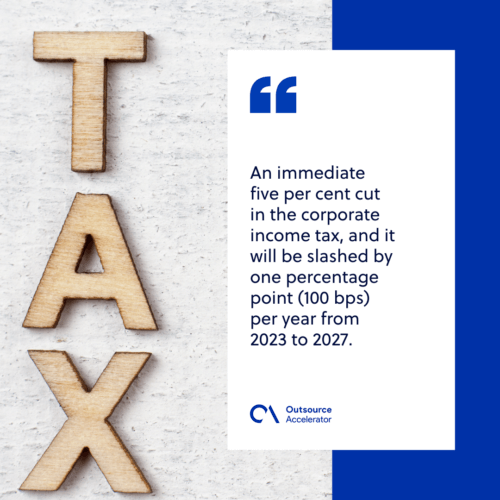About CREATE Tax Law: Its impact on the Philippines, businesses and the outsourcing industry

After almost a year of waiting, President Rodrigo Duterte finally signed the Comprehensive Recovery and Tax Incentives for Enterprises (CREATE) bill into law. CREATE, also known as the Republic Act (RA) 11354, will provide stimulus measures that can help the country recover from the adverse economic impact of the COVID-19 pandemic.
The CREATE Law will slash a chunk in corporate income taxes, which lawmakers hope can help in attracting more foreign investments.
What is the CREATE tax law (Republic Act (RA) 11354)?
The main selling point of the (RA) 11354 CREATE law is that it slashes the country’s current Corporate Income Tax (CIT) from 30 to 25 per cent. For domestic companies with a taxable income of PHP5 million and below, and with total assets of not more than PHP100 million, their CIT will be cut from 30 to 20 per cent.
The lower tax rate is retroactive, as it will take effect from July 1 of 2020. However, the CREATE law itself will officially be effective on April 11, 2021.
Since the law (and the 25% CIT) is retroactive, Atty. Alex Cabrera of PwC Philippines says an effective tax rate of 27.5 per cent should be applied to a company’s taxable income in 2020.

Key provisions of the CREATE bill
As published in the Department of Finance (DOF)’s website, here are some of the key provisions of the recently-signed law:
- There will be an immediate five per cent cut in the corporate income tax, and it will be slashed by one percentage point (100 bps) per year from 2023 to 2027. This means that qualified businesses can take advantage of the 20 per cent corporate tax from 2027 onwards.
- While the president is granted the power to modify the period of eligibility to avail incentives, registered businesses can enjoy these incentives for up to 40 years.
- In order to attract larger investments from their target investors, the Board can recommend appropriate non-fiscal support in addition to the tax incentives. They may provide support in the form of: logistics, costumes, product testing and certification, training, facilitation of registration and certification requirements from government agencies; and shared/common services facilities.
The president will then approve these additional set of incentives, which can be availed for longer periods of time if necessary.

How can CREATE Law improve the Philippine economy?
Lawmakers and key government officials are optimistic about CREATE Law’s expected positive impact in the Philippine economy.
DOF Secretary Carlos Dominguez III assures that the newly-enacted law “will right away benefit Micro, Small, and Medium Enterprises (MSMEs).”
Around P37 billion is expected to be slashed from government revenues by the second half of 2021 alone due to the passage of CREATE law. The administration expects that these savings can be used to fund MSMEs’ operations so they’ll retain their employees.
For the next five years, the DOF estimates around P476.8 billion in foregone government taxes.
This way, more investors will be attracted to invest in the Philippines, helping the country recover from the pandemic. The combined savings in the next few years are also expected to create additional job opportunities for the Filipino workforce.
“In the long run, savings from the reduction in CIT rates will provide enterprises with more resources to re-invest in their businesses or expand their operations and thus create more jobs,” said Dominguez.
CREATE Law (Republic Act (RA) 11354) and the Philippine outsourcing industry
The Business Process Outsourcing (BPO) industry remained a counter cyclical sector, as it only endured relatively minimal “damages” amid the pandemic.
However, it is undeniable that the sector needs support if it’s playing its role as one of the main pillars of the country’s economy.
The CREATE Law brings the country’s corporate tax rate closer to its neighboring competitors. For reference, India (25.17%), Vietnam (20%), Indonesia (22%), and Singapore (17%) all have lower CIT rates than the Philippines.
According to Acting Socioeconomic Planning Secretary Karl Kendrick Chua, the passage of RA 11354 “put[s] the country in a better position to compete for investments.” The law “enhances our fiscal incentives system to help attract more foreign direct investments (FDIs), which will help generate more jobs and accelerate our recovery.”
When it comes to CREATE Law’s actual results and positive impact, only time will tell. For the meantime, government officials and the private sector are all keeping their fingers crossed.







 Independent
Independent




